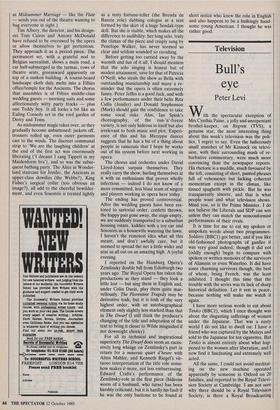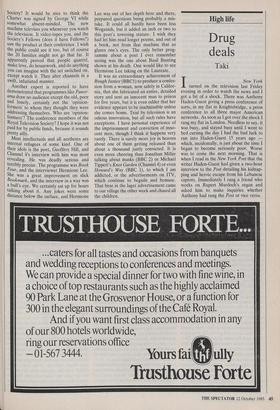Television
Bull's eye
Peter Levi
With the spectacular exception of Mrs Cynthia Paine, a jolly and unrepentant brothel-keeper, on Regrets (TVS), a genuine star, the most interesting thing about this week's television was the poli- tics, I regret to say. Even the ludicrously small snatches of Mr Kinnock on televi- sion, with their surrounding mush of re- barbative commentary, were much more convincing than the newspaper reports. His rhetoric is a muddle, much favoured by the left, consisting of short, panted phrases full of vehemence but lacking coherent momentum except in the climax, like tinned spaghetti with pickle. But he was transparently sincere, and that is what people want and what television shows. Mind you, so is the Prime Minister. I do not believe the Liberals and SDP can win unless they can match the nonconformist performances of their rivals.
It is time for me to eat my spoken or unspoken words about two programmes. Soldiers (BBCI) got better, and if you like old-fashioned photographs of gunfire it was very good indeed, though it did not (oddly enough) begin to compare with spoken or written memoirs of the survivors of Alamein or even Waterloo. It did have some charming survivors though, the best of whom, being French, was the least inhibited. I thought this time that the trouble with the series was its lack of sharp historical definition. Let it rest in peace, because nothing will make me watch it again.
I have more serious words to eat about Tenko (BBCI), which I once thought was about the disgusting sufferings of women under the Japanese. That was a nasty world I do not like to dwell on: I have a friend who was captured by the Malays and sold to the Japanese for ten cigarettes. But Tenko is almost entirely about what hap- pened to the women after liberation, and I now find it fascinating and extremely well acted.
All the same, I could not avoid meditat- ing on the new machine operated apparently by someone in Oxford on 20 families, and reported to the Royal Televi- sion Society at Cambridge. I am not sure why there should be a Royal Television Society; is there a Royal Broadcasting Society? It would be nice to think the Charter was signed by George VI while somewhat absent-minded. The new machine televises you whenever you watch the television. It video-tapes you, and the Society's Fellows (does it have Fellows?) saw the product at their conference. I wish the public could see it too, but of course the 20 families might not go that far. It apparently proved that people quarrel, make love, do housework, and do anything you can imagine with the set switched on except watch it. They alter channels in a swift, infuriated manner.
Another expert is reported to have demonstrated that programmes like Panor- ama draw no audience except the old, poor and lonely, certainly not the 'opinion- formers' to whom they thought they were addressing themselves. Who are 'opinion- formers'? The conference members of the Royal Television Society? I hope it was not paid for by public funds, because it sounds pretty silly.
Most intellectuals and all aesthetes are Internal refugees of some kind. One of their idols is the poet, Geoffrey Hill, and Channel 4's interview with him was most revealing. He was deadly serious and terribly precise. The programme was Book Four, and the interviewer Hermionc Lee. She was a great improvement on slick Bookmark, and the interview in a way was a bull's eye. We certainly sat up for hours talking about it. Any jokes were some distance below the surface, and Hermione
Lee was out of her depth here and there, prepared questions being probably a mis- take. It could all hardly have been less Woganish, but it added an inch or two to this poet's towering stature. I wish they had let him read longer poems, and out of a book, not from that machine that so glazes one's eyes. The only better prog- ramme about a poet I ever remember seeing was the one about Basil Bunting shown at his death. One would like to see Hermione Lee taking on the Laureate.
It was an extraordinary achievement of Rough Justice (BB C1) to produce a confes- sion from a woman, now safely in Califor- nia, that she fabricated an entire, detailed story and sent an innocent man to prison for five years, but it is even odder that her evidence appears to be inadmissible unless she comes home. Trial by television is an odious innovation, but all such rules have exceptions. I have personal experience of the imprisonment and conviction of inno- cent men, though I think it happens very rarely. There is surely more joy in heaven about one of them getting released than about a thousand justly convicted. It is even more cheering than Jonathan Miller talking about masks (BBC 2) or Michael Tippett's Knot Garden (Channel 4) or even Howard's Way (BBC 1), to which I am addicted, or the advertisements on ITV, which continue to beguile and bemuse. That bear in the lager advertisement came to our village the other week and chased all the children.























































 Previous page
Previous page